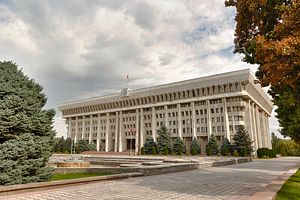Today, the Kyrgyz parliament voted in favor–83 to 23–of the proposed “foreign agents” bill. This was the first reading of the bill–which has been in the works since 2013–and it will need to pass two more readings and get the president’s signature before becoming law.
The bill, as local media reports, would require non-commercial, non-governmental, organizations involved in “political activities” that are funded by foreign sources to register as “foreign agents.” The label, David Trilling writes, is “widely associated with espionage in the former Soviet Union.” The bill would intensify oversight of NGOs and civil society organizations, allowing the Ministry of Justice “the power to send representatives to participate in internal activities and to determine whether or not the organization complies with the goals of its creation.” Lastly, the bill includes changes to the criminal code that would make establishing an NGO with aims to “incite citizens to refuse to fulfill their civic duties or commit other unlawful acts” punishable by up to three years in jail.
One of the more interesting things regarding the “foreign agents” bill is the apparent split between President Almazbek Atambayev and MPs from his party–the Social Democratic Party. In 2013, shortly after two MPs floated the idea of emulating Russia’s recently-passed “foreign agents” law, Atambayev made comments during a trip to Brussels that he believed there was no need for such a law in Kyrgyzstan. His tune has changed, it seemed. Recently, his comments lean toward favoring the bill. After visiting Brussels in April this year, he said in an interview with 24.kg that:
When the bill comes to me, of course I’ll think. There are two versions of the law on foreign agents – adopted in Russia and another in the United States in 1937. I even don’t know which of the versions will come to me. In any case I will check if the laws correspond to interests of the country, whether they complied with human rights. Now I don’t want to promise you anything. Today we are facing with the fact that under the guise of human rights organizations, NGOs are opening and trying to destabilize the situation in the country, international relations.
I’ve previously outlined why the comparison to the U.S. law is deeply problematic. It’s also been very clear since it was first proposed that the Kyrgyz “foreign agents” bill was based on the Russian law. The bill’s lead author, Tursunbai Bakir uulu, said at much in a 2013 interview with Eurasianet: “If our colleagues abroad come up with a good idea, why not adopt it?” he said.
Atambayev’s shift in opinion is a product of changing geopolitical winds. Since the “foreign agents” law was first proposed Kyrgyzstan has grown markedly closer to Russia–joining the Eurasian Economic Union in recent weeks. Meanwhile, U.S. presence in the region has declined, most noticeably in Kyrgyzstan with the departure of the final U.S. troops from the Manas Transit Center last summer.
Another of the bill’s co-sponsors, Nurkamil Madaliev, told Eurasianet in December that the law would help Kyrgyzstan fend off two existential threats: “Islamic extremism funded by wealthy Gulf Arabs and the efforts by some Western-funded organizations to educate young Kyrgyz about gay rights and reproductive health.”
Members of Atambayev’s party have not all come around to believing in the necessity of the bill. Daniyar Terbishaliev, a Social Democrat MP, delayed the bill briefly at the end of May, saying it was inconsistent and vague. He suggested that even MPs, under the law, would need to register as “foreign agents”:
“I would like to note that a broad interpretation of many of the terms in this bill, including ‘political activities’ could […] be used against every one of us here. Almost every MP has interactions with international organizations to some extent. Almost every MP goes on foreign business tours funded by international organizations. Tursunbai Bakir uulu [one of the bill’s chief backers], you have also been on such trips. We all know, that most of them are sponsored by international organizations. Tomorrow anyone of us could be said to have offered help to a foreign agent, to a spy.”
Numerous international human rights organizations have repeatedly sounded alarm over the bill. Human Rights Watch said most recently that “the draft law contravenes Kyrgyzstan’s constitution as well as its international human rights obligations to protect freedom of association and expression.”
































